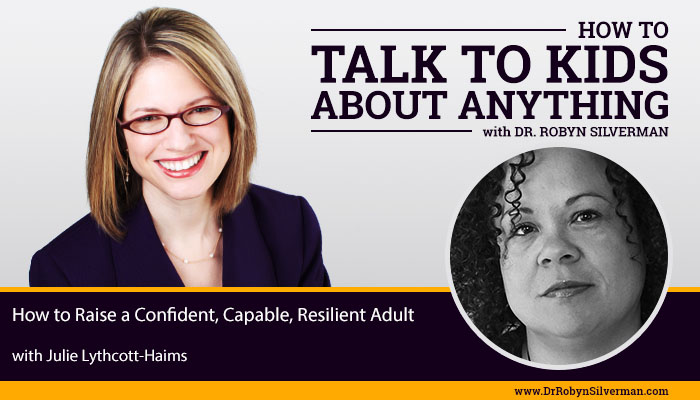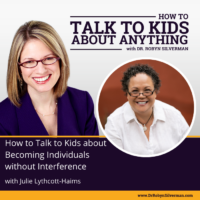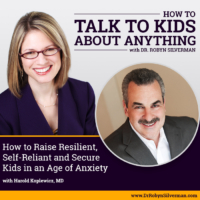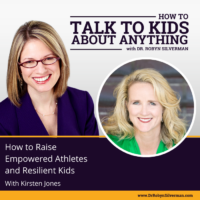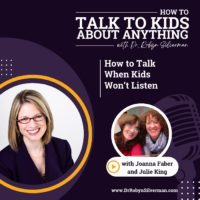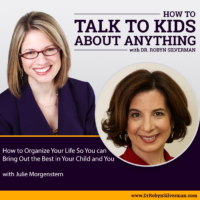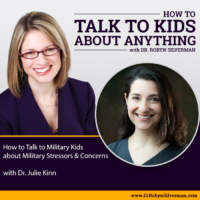Podcast: Play in new window | Download
Subscribe: Apple Podcasts | RSS | More
How to Raise a Confident, Capable, Resilient Adult
 In her 2016 Ted Talk, Julie Lythcott-Haims started off by saying, “there’s a certain style of parenting these days that is kind of messing up kids, impeding their chances to develop into themselves. There’s a certain style of parenting these days that’s getting in the way. I guess what I’m saying is, we spend a lot of time being very concerned about parents who aren’t involved enough in the lives of their kids and their education or their upbringing, and rightly so. But at the other end of the spectrum, there’s a lot of harm going on there as well, where parenting feel a kid can’t be successful unless the parent is protecting and preventing at every turn and hovering over every happening and micromanaging every moment, and steering their kid towards some small subset of colleges and careers….our kids end up leading a kind of check-listed childhood, she goes on to say, such that, she warns that once they end up at the end of high school they are breathless—of course—they have spent so much time having been obsessed with grades and activities—becoming what they are supposed to be rather than exploring who they may want to become. What interests them. And knowing, with their own brains and experimenting with their own grit and their own skills—to develop into a self-sufficient, resilient adult. So it begs the question—what can we do to break free from the overparenting trap that says we must be on our children every minute prodding and directing, being our child’s concierge, as Julie Lythcott-Haims labels, and instead, preparing our children to become successful adults who can stand on their own two feet.
In her 2016 Ted Talk, Julie Lythcott-Haims started off by saying, “there’s a certain style of parenting these days that is kind of messing up kids, impeding their chances to develop into themselves. There’s a certain style of parenting these days that’s getting in the way. I guess what I’m saying is, we spend a lot of time being very concerned about parents who aren’t involved enough in the lives of their kids and their education or their upbringing, and rightly so. But at the other end of the spectrum, there’s a lot of harm going on there as well, where parenting feel a kid can’t be successful unless the parent is protecting and preventing at every turn and hovering over every happening and micromanaging every moment, and steering their kid towards some small subset of colleges and careers….our kids end up leading a kind of check-listed childhood, she goes on to say, such that, she warns that once they end up at the end of high school they are breathless—of course—they have spent so much time having been obsessed with grades and activities—becoming what they are supposed to be rather than exploring who they may want to become. What interests them. And knowing, with their own brains and experimenting with their own grit and their own skills—to develop into a self-sufficient, resilient adult. So it begs the question—what can we do to break free from the overparenting trap that says we must be on our children every minute prodding and directing, being our child’s concierge, as Julie Lythcott-Haims labels, and instead, preparing our children to become successful adults who can stand on their own two feet.
Julie Lythcott-Haims roots for humans. Humans need agency in order to make their way forward; Julie is deeply interested in what impedes us. She is the New York Times bestselling author of How to Raise an Adult, an anti-helicopter parenting manifesto which gave rise to one of the top TED Talks of 2016, and now has over 3 million views. Her second book is the critically-acclaimed prose poetry memoir Real American, which illustrates her experience with racism and her journey toward self-acceptance. A third book on how to be an adult, for young adults, is forthcoming. She is a former corporate lawyer and Stanford dean, and she holds a BA from Stanford, a JD from Harvard, and an MFA in Writing from California College of the Arts. She lives in the San Francisco Bay Area with her partner of thirty years, their teenagers, and her mother.
The podcast provides:
- What compromises our kids’ ability to become a confident, capable, resilient adult.
- What it means to have a “checklisted childhood.”
- What kids should be able to do by the time they are 18.
- Skills kids need to acquire during childhood through chores.
- What to say to your child when s/he comes home from school.
- What we lose by overparenting.
- How to step back so our kids can step up.
Important Messages:
- Many parents feel that they have to play a role in the management of life for their college student. What is wrong here? This age
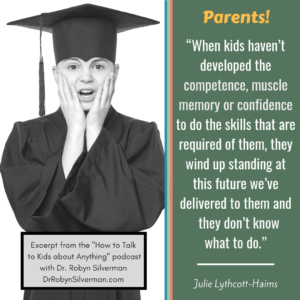 group used to be much more self-sufficient. Why are parents having trouble trusting their young adults?
group used to be much more self-sufficient. Why are parents having trouble trusting their young adults? - Today, students seem to be grateful that their parents are taking over—rather than embarrassed or surprised. Kids don’t seem to be individuating like they did. Need a hunger to want to be in charge of yourself. What will happen if you keep waiting to take control of your life?
- Overparenting falls into 3 categories: Overprotective (world is unsafe, not preparing child, not giving skills, tracked children), fiercely directed (you will do as I say because I know best, conditional love), concierge (everything is handled and scheduled). These all work in the short term. You prevent the problems. Always there to catch them.
- When we are always rescuing, our children can’t learn the lessons to apply them to the next time the situations happen.
- Checklisted childhood- it’s the parent’s own ego- the right classes, the right preschool, the right grades, the right colleges. Unethical behavior. Tutoring. Work to make the child’s outcomes better. Prepping for tests. Activities they have to do. Community service. The right awards. The right sports. No more time in the day. They become brittle and breathless and fragile at the end of childhood.
- Is your child interested in doing these activities or are YOU interested in your child doing this?
- Focus on what your child wants to do instead of trying to keep up with the Joneses. Your relationship with your kid will improve, sanity will return. You are saying, ‘I’m choosing to see you for who you are rather than trying to turn you into something I might have wished you would be or everyone else thinks you should be.’ Stand up to the overparenting crowd- they are unhappy and wish they could have some more sanity too!
- Parents need to fill our lives with their OWN stuff. Read books, go to the theater, hang out with friends! We can’t just show up on the sidelines of our children’s activities. Parents- get your own life!
- Remember- there are other colleges besides this tiny list of big brand-name colleges that deny 90-95% of applicants. Too stressful!
- If our kids can’t fend for themselves, then we’ve failed. We’ve failed them and we’ve failed at parenting.
- Our kids don’t need to be perfect. How do you learn to stack the dishwasher but by stacking the dishwasher? They learn that things aren’t getting clean or you want to fit more stuff and then you try something else!
- Stacy Ashland: How do you teach your kids skills? 4 steps. (1) Do it for them. (2) Do it with them. (3) Watch them do it (4) They do it for themselves. Whether it’s one day or weeks or year- these are the steps. Transition from you doing it all to them doing it all with the 2 steps in between as it transfers.
- The longest longitudinal study ever done showed that those people who were most successful in life used to do chores (or had a part time job in high school). It builds work ethic. You need to contribute. You do your part to benefit of the whole. But checklisted childhood deprives them of chores.
- Even young kids can participate in chores. Dusting, place plastic silverware, unload dishwasher, etc.
- Must teach children to be responsible. Don’t rescue. Learned early- will serve them! Left backpack? Don’t get it! Ask- what can you do? What are your options? Think through. Teaching them “this is your life.”
- You don’t build competency in a day- it takes a long time. Eventually, if they keep doing it, they build mastery.
- Too much time is focused on grades and academic outcomes. Then love seems like it’s conditional. How about “I know that I keep asking about grades and that might make you feel like I think you don’t care. But I know you do and I’m sorry. So for one week I’m going to practice not asking at all.”
- Careful of the parent portal that makes it so you can keep checking grades.
- When we take an interest in us instead of our grades, improves relationship.
- 4-3-2-1 tip. Stop saying “we” when talking about what your child is doing. Stop arguing with the authority figures in our children’s lives. Teach your kid to advocate for himself. Stop doing your child’s homework (unethical and your child learns to believe that s/he can’t do it him or herself).
Notable Quotables:
- “We don’t want 18-22-year-olds who can’t make a decision, solve a problem or cope with a minor setback that life throws you. We need to raise them so that they have the skills and the mindset and the wherewithal to fend for themselves.”
- “Many young adults between the ages of 18 and 22 haven’t gone through the natural developmental stage where you separate from your parent—when you are no longer a child being kept and cared for, you separate from them and develop your own sense of self, confidence and skills. And it made me wonder; ‘kid, when are you going to hunger to be in charge of yourself and what’s to become of you if you don’t? If you delay that to 25 or 30, what’s to happen to you and how much harder will it be to seize control of your life?
- “What will happen to all of us if this generation doesn’t know how to #adult? Who’s going to lead us? Who’s going to be in charge?” Who’s going to have the wherewithal and the confidence and the know how to move an institution, government, family or organization forward?”
- “If a parent overly helps an outcome to happen or does a lot of protecting for that outcome to happen or directs that outcome from the get-go, the kid’s psyche knows s/he didn’t do it him or herself. This is what leads to higher rates of anxiety and depression. The short-term gain comes with long term pain. It’s harming kids and we have to stop.”
- “The learning only comes when we experience the consequence. When we are always rescuing our child, the brain never experiences the “ouch.” The parent’s rescuing denies that child’s brain from learning the lesson which would allow him to remember it for the next time.”
- “The ‘checklisted’ parents need to make sure their children are in the right classes, the right sports, the right classes with the right grades. There’s tutoring and test prep, leadership and community service. And all of these activities are stuffed into the 7 days a week that childhood affords. Childhood hasn’t gotten any longer. There are no more hours in a day but now-a-days, it has become normal to fill a child’s life from waking up to going to sleep with structured activities, academic or athletic enrichment because we’ve been duped into thinking that this is what it takes to get them to the right future. The trouble is that a childhood lived like this compromises sleep, free time, downtime and our kids get to the end of childhood and they are brittle and breathless and fragile.”
- “If a kid loves a sport, then more power to them. But if YOU are dragging your kid to something because you are trying to keep up with the Joneses, don’t do it! Turn back around and say; ‘how about we focus on what YOU want instead of what everyone else seems to be doing?’ Your kid’s outlook will improve, your relationship will improve, because what you are saying is; ‘I’m choosing to see you for who you are rather than trying to turn you into something I might have wished you would be or everyone else thinks you should be.’ It takes guts to stand up to this overparenting crowd.”
- “The checklisted childhood is not only taking a toll on children, it’s taking a toll on parents!”
- “Nowadays, it feels like neglect when we don’t show up to every practice. We’ve done that. It’s time for those of us who know this is BS to stand up and say; ‘I can’t come to practice today. I’ve got other things to do.’ We have to fill our lives with adult activities! We have filled our lives with sitting on the sidelines of our kids’ activities and driving them everywhere. We have become anxious, fragile and feeling empty because our lives lack a richness that we would have if we had a little more downtime and balance. A more relaxed life would be healthier for everyone.”
- “If our offspring can’t fend for themselves in the most basic of ways—then we’ve failed.”
- “You don’t help kids in life by doing it all for them. Those children need to learn how to crawl, how to walk and ultimately, walk away from you and be okay when they are no longer with you.”
- “Don’t rescue. We need to teach our kids; ‘this is your life’ and ‘you’re responsible.’ It sounds cruel but it’s not. It’s this loving lesson which, learned early, will give them so many more skills and tools than so many others their age who are used to being micromanaged and handled and looked after. These young people will have their act together and will delight in being responsible for themselves.”
- When kids haven’t developed the competence, muscle memory or confidence to do something with us, they wind up standing at this future we’ve delivered to them and they don’t know what to do.”
- “How was your day? “(Fine) “Tell me one thing that was fine or better than fine today.”
- “Let’s step up for our kids by stepping back. That is how we will raise them to become successful, thriving adults.”

